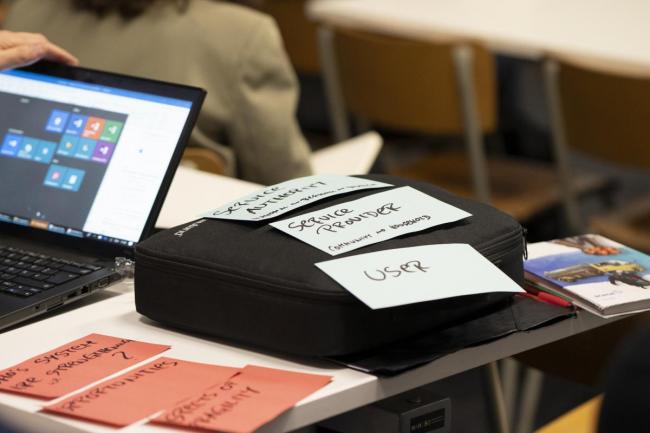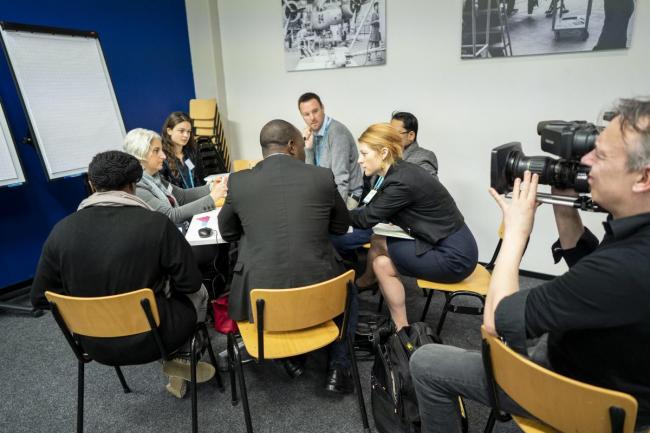Five sessions on capacity building during the IRC symposium provided additional knowledge and skills in WASH systems practice.
Published on: 08/04/2019
Capacity Building (CB) is a long established critical component of Water, Sanitation and Hygiene (WASH) and there are many methods and tools available and in use globally. It is about the ability of organisations and people to function in their environment. It emerges from a process of learning and development.
At the IRC All System Go! Symposium in March 2019 in The Hague, CB was one of the six thematic areas that attracted over 100 participants. Five sessions were organised that provided the participants with additional knowledge and skills in WASH systems practice using examples from different fields, stakeholders and institutions.

The first session on Exploring the complexity of local WASH systems. A participatory factor-mapping workshop was convened by the USAID Sustainable WASH Systems Learning Partnership and facilitated by Nick Valcourt (University of Colorado Boulder) and Jeffrey Walters (George Fox University). Facilitators presented the factor mapping approach and how it could be used to explore the complexity of local WASH systems. Through group discussions and practice of a “willingness to pay” scenario, participants developed a matrix of six factors (quality of service, affordability, social factors, regulation, trust and willingness to pay), ranked them according to 30 different influence relationships in the matrix and used the data to develop an influence map and a causal loop diagram.
Participants learnt that factor mapping is:
The second session on WASH planning from a systems perspective - what to ask, who to involve, when to do this was organised and facilitated by Dr. Gilbert Buckle (Health Federation of Ghana). The session enabled participants to learn how to institutionalise structural change in healthcare systems using a WASH systems approach. Discussions focused on how to make the case for WASH in health care facilities and how to assess the readiness of a health care facility to use the WASH systems approach.
Participants identified the critical leadership and management skills and mindsets needed to champion, design and implement WASH in health care facilities. They noted that the WASH system was not an end in itself, but a contribution to the health care system. They learnt that it was important to bring WASH and healthcare systems together and explore the interface between them. They also agreed that to institutionalise WASH within health care facilities, the WASH sector needs to; know what is needed to support the outcome in each of the nine WASH system building blocks, what healthcare systems do so that healthcare systems can integrate and own WASH solutions and what outcomes based on patient experience are expected from the healthcare system.
The third session on System mapping and identifying leverage points – a simplified process for practitioners was convened by WASH Catalysts and BASEflow and facilitated by Sydney Byrns. The session introduced Donella Meadows Theory of Systems Thinking and drew from WASH Catalysts’ experience in Malawi to explain how through systems thinking a shift from projects to services was achieved and how an NGO exit strategy for long-term results was designed.
Ten tips for Dancing with Systems were shared. These enabled participants to recognise and understand the following:
Participants further learnt that the leverage points in the system though small, could lead to large shifts in behaviour. For example, subsidy introduced to low-income housing in an urban setting could produce unintended consequences such as a reduction in household incomes. Participants also discussed the different ways of conducting a system mapping exercise, draw linkages between stakeholders, understand responsibilities of actors and identify strengths, weaknesses and dependencies, etc.
The fourth session on What core competencies are needed in WASH? Develop your very own WASH master plan and see! was convened by McGill, Lund and Durham Universities and CHAMEG and facilitated by Prof. Susan Gaskin (McGill University), Angela Huston (IRC/McGill University), Dr. Sara Gabrielsson (Lund University), Dr. Fidelis Folifac (UNHCR) and Dr. Jennifer Thompson (Durham University).

Through a role-play game and group discussions participants acquired some skills for developing a methodology for practicing systems thinking in WASH and delivering universal and sustainable WASH services in a dynamic context. Core competences presented included systems thinking, anticipatory competence, normative competence and strategic competence. Participants agreed that core competences needed for WASH included a neutral party who understands the complexities of the system and the bigger picture plan, the diversity of stakeholders, risk management, proper prioritisation during planning and transparency, and can fit together different elements of the system.
The last session on Theory of change and systems change was convened by New Philanthropy Capital (NPC) and facilitated by Katie Boswell (NPC). Participants were introduced to the Theory of Change concept, its usefulness to systems change, the basic elements of theory of change and how to apply it to systems change work. Through small group discussions, participants learnt that Theory of Change is a process not a product that helps to articulate how change happens through activities, outcomes and impacts. They also learnt that Theory of Change is practical, accessible, is capable of modelling complex changes, but can also undermine systems change in a number of ways (in neglecting context, in changing others only, in thinking in linear terms, in presenting changes as technical, in seeking safety in certainty, in oversimplifying complex realities). They recognised that while systems thinking was the map of the terrain, Theory of Change was the compass for navigating the terrain.
Delivering SDG 6 by 2030 requires the WASH sector to contribute to the global plans to “end poverty in all its forms”, to “shift the world on to a sustainable and resilient path” and to ensure that “no one will be left behind". This calls for concerted efforts to enhance the competencies and capacities of all those involved in WASH systems promotion and implementation. Capacities of WASH stakeholders need to be enhanced to enable them to understand the systems approach and to view the system as a whole, reflect on what they have observed and learnt, discuss the issues with each other, find different ways of working, co-create knowledge, develop a shared vision, and take a forward-looking perspective on the issues.
At IRC we have strong opinions and we value honest and frank discussion, so you won't be surprised to hear that not all the opinions on this site represent our official policy.